Apr
3
2012
or As Far as the East is from the West
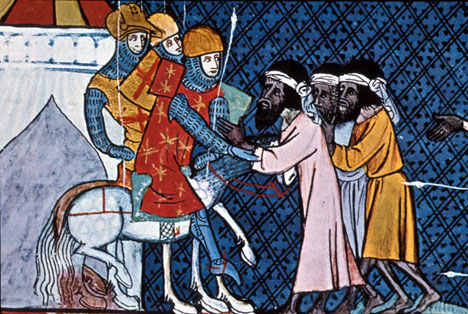
“That very day Pilate and Herod became friends with each other, for previously they had been at enmity with each other.” (Luke 23:12)
“Secular humanism and Islam are merely the bipolar moods of Christless Christianity. They can be united only in suicide.”
Getting a grip on the Tabernacle layout helps us understand the architecture of Creation, the history of mankind and the structure of the entire Bible. After reading Mark Steyn on the Islamic/secular conflict in Europe, I was thinking that the same “Tabernacle” categories can be found in the world today. Whatever we do, however much we distort the truth, we are still bound by the walls and furnitures set up in Genesis 1. And, in my humble opinion, the light this sheds on the current conflict is not only revealing concerning its true nature, but it also helps us to predict its future.
Continue reading
Comments Off | tags: AD70, Church History, Culture, David P. Goldman, Herod, Incense Altar, Islam, Lampstand, Mark Steyn, Martyrdom, Melchizedek, Tabernacle | posted in Bible Matrix, Biblical Theology, The Last Days
Feb
16
2012
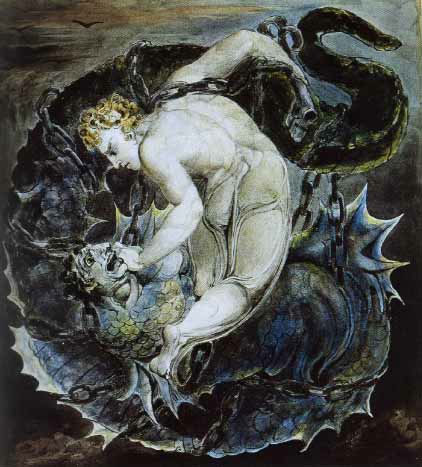
“No one can enter a strong man’s house and plunder his goods, unless he first binds the strong man. And then he will plunder his house.” (Mark 3:27 27)
A lot of commentary on the Revelation seems oblivious to the allusions to the Pentateuch (although there are many that do take it into account and are enlightening at the most obvious points). Even the “binding” of Satan in Revelation has an Old Testament background.
Continue reading
Comments Off | tags: AD70, Against Hyperpreterism, Communion, Millennium, Postmillennialism, Revelation 20, Totus Christus | posted in Bible Matrix, Biblical Theology, The Last Days
Feb
14
2012

“Let this mind be in you which was also in Christ Jesus, who, being in the form of God, did not consider it robbery to be equal with God, but made Himself of no reputation, taking the form of a bondservant, and coming in the likeness of men. And being found in appearance as a man, He humbled Himself and became obedient to the point of death, even the death of the cross. Therefore God also has highly exalted Him and given Him the name which is above every name, that at the name of Jesus every knee should bow, of those in heaven, and of those on earth, and of those under the earth, and that every tongue should confess that Jesus Christ is Lord, to the glory of God the Father.” (Philippians 2:5-11)
This passage (or pericope?) retraces the Covenant pattern, which is also played out in the flow of the history of Israel. We’ll have a look at the structure of the passage and then I want to discuss the significance of the literary placement of “every tongue.”
WARNING: Weird ahead.
[This post has been refined and included in Sweet Counsel: Essays to Brighten the Eyes.]
Continue reading
2 comments | tags: Achan, AD70, Babel, Babylon, Circumcision, Covenant Theology, Evangelism, Genesis, Herod, Joshua, Moses, Pentecost, Philippians, Postmillennialism, Systematic typology, Tabernacle, Tongues | posted in Bible Matrix, Biblical Theology, The Last Days
Feb
8
2012
Atonement and Enthronement

“Jesus does what no medicine man
or witch doctor is able to do.”
And they came to Jesus and saw the demon-possessed man,
the one who had had the legion, sitting there,
clothed and in his right mind, and they were afraid. – Mark 5:15
Rich Bledsoe’s old blog is a goldmine. Here’s an excerpt from The Dysfunctional Family of the Gadarene Madman.
Continue reading
Comments Off | tags: Abel, AD70, Atonement, Cain, Circumcision, Edwin Friedman, Feasts, Genesis, James Jordan, Job, Matthew, Rene Girard, Revelation, Rich Bledsoe | posted in Biblical Theology, Quotes, The Last Days
Feb
6
2012
or Ethnic Cleansing as Mercy

“In representative terms, the people of God are no longer the Land but the heavenly Sea. The Church herself is the oncoming storm.”
In The Days of Vengeance [PDF], David Chilton did a great job of introducing many of us to the fact of Jesus’ use of “cosmic language” in Matthew 24 to describe the end of the Old Covenant. Not only is the idea of an actual, physical star falling to earth impossible (can you imagine the sun “falling to earth”?) but Jesus is quoting from a prophecy against Babylon. His audience would have realized this as a scathing attack against the Herods and their “government controlled” Temple worship. So, the language is clearly poetic, but why would the prophets—and Jesus and His apostles—deliberately cause so much confusion by using cosmic language to describe non-cosmic events? The answer is found in the mercy of God.
Continue reading
3 comments | tags: AD70, Baptism, Circumcision, Communion, Postmillennialism, Tabernacle, Temple | posted in Against Hyperpreterism, Bible Matrix, Biblical Theology, The Last Days
Dec
24
2011
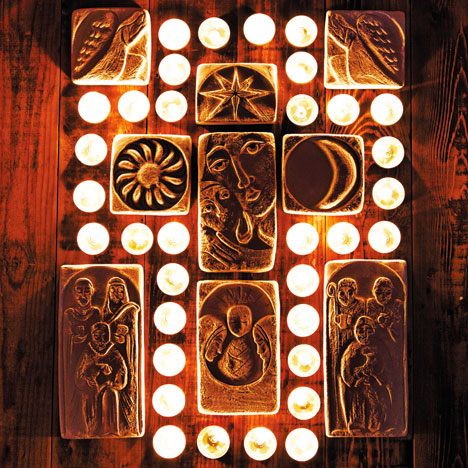
The Literary Structure of Luke 2
God loves architecture. He starts with a Garden, moves to stone, then to flesh. Should it surprise us that the Nativity and the events surrounding it follow the same patterns as the Tabernacle and the Creation week?
Continue reading
Comments Off | tags: AD70, Christmas, Covenant Theology, Feasts, Literary Structure, Luke | posted in Bible Matrix, Biblical Theology
Dec
9
2011
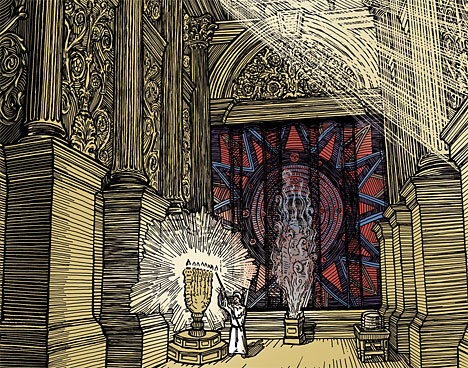
The Living Dead and the Dead Living
Creation: In part 1 we saw that the theme of the first stanza of 2 Thessalonians 2 was the “Sabbath” rest of the church. Paul writes to remove the alarm caused by the “conspiracy theorists” who attempted to disturb it.
Division: The second stanza concerned the splitting of the church into two — those who would persevere despite the growing threat of tribulation throughout the empire [1], and those who would succumb to their fears. The attacks would culminate in the completion of Herod’s Temple and the Nero’s burning of Rome in AD64. The first threw doubt upon the words of Christ concerning the Temple, and the second, though hardly believed, was an excuse to scapegoat this new Jew-Gentile sect, now legally separated from the protection afforded to Jews by Rome. The gospel tore Judaism in two. Then it united those believing Jews with Gentiles. But as in the wilderness, new Israel would be threshed and purified.
Continue reading
Comments Off | tags: AD70, Atonement, Booths, Dispensationalism, Feasts, James Jordan, Literary Structure, Paul, Ray Sutton, Revelation, Ten Commandments, Thessalonians | posted in Bible Matrix, Biblical Theology, The Last Days
Dec
7
2011
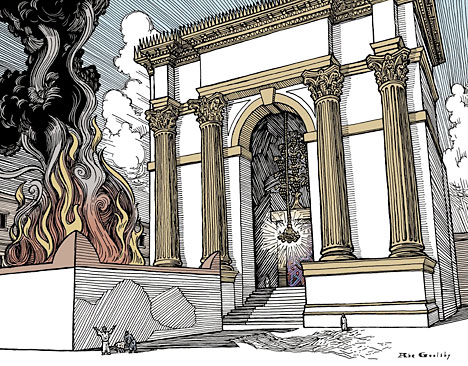
This post concerns the Covenant-literary structure of 2 Thessalonians 2. The context and audience are first century, but it amazes me how willing we modern Christians are to do intricate hermeneutical acrobatics to avoid the obvious conclusion that the particular “coming” of Christ referred to here was also a first century event – the end of the Old Covenant in AD70.
A reasonably close look at the text makes it inescapable. A very close analysis makes it inexcusable, especially once we are versed in the literary mechanics of the Bible Matrix. Continue reading
1 comment | tags: AD70, Atonement, Circumcision, Covenant curse, Covenant Theology, Hermeneutics, Herod, High Priest, Jericho, Paul, Thessalonians, Urim and Thummim | posted in Bible Matrix, Biblical Theology, Ethics, The Last Days
Nov
9
2011
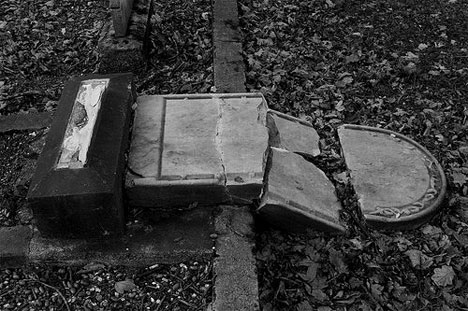
Micah Martin (brother of one of the authors of Beyond Creation Science), has kindly read Bible Matrix II and written about my adherence to the Genesis account of Creation as both Covenant and history (i.e. the account is not simply an account of the physical world being given a Covenantal purpose as a Temple, but also its actual Creation). There is much that we agree on, but the disagreement on this subject couldn’t be sharper, or of more importance.
Continue reading
2 comments | tags: Abraham, AD70, Against Hyperpreterism, Babylon, Covenant Creationism, Dispensationalism, Flood, Noah | posted in Against Hyperpreterism, Bible Matrix, Biblical Theology, Creation, Quotes, The Last Days
Sep
22
2011

or The False Bride Will Never Get A Management Position
“…the only unity that will be allowed by the Father is the unity that Jesus requested from the Father in John 17.”
One of the interesting “universal themes” that James Jordan has uncovered in the Bible is that of Satan’s various attempts to “gather the nations” against the Church. You can read about that in a series of blog posts called Amalek Debunks Hyperpreterism (click here and scroll down).
Continue reading
4 comments | tags: AD70, Babel, Economics, Herod, James Jordan, New Jerusalem, Postmillennialism | posted in Biblical Theology, The Last Days



































